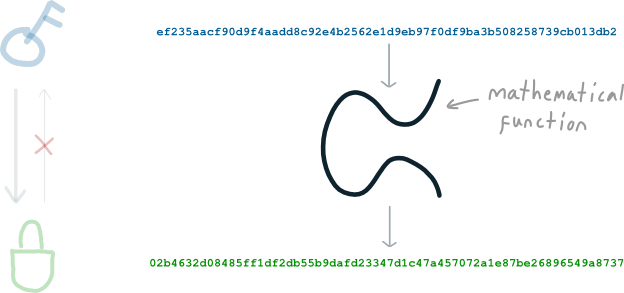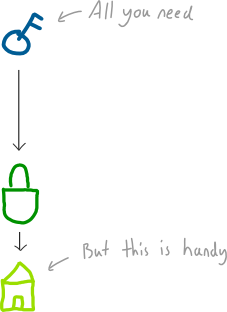- All private keys. Leaked Bitcoin and Altcoin keys.
- All private keys list
- Try your luck
- Attack to brain wallet
- Check Bitcoin address
- Private and Public Keys
- Private Keys
- Generating a private key from a random number
- How to see all keys
- All bitcoin private keys and addresses
- Project
- Private Key Search
- Brainwallets
- Pick a page
- Balance Checkers
- About
- First and foremost PrivateKeys.Space is an educational project that shows the strength of the vast key space.
- The beginning
- Generating private keys
- How big is the private key space?
- AllPrivateKeys
- Contents
- All Bitcoin and Altcoins private keys list [ edit ]
- BrainWallet private keys [ edit ]
- Leaked, hacked or collected private keys [ edit ]
- Whose Bitcoin address [ edit ]
- Blog and Articles [ edit ]
- Keys & Addresses
- What is a private key, a public key, and an address?
- Where do keys and addresses come from?
- Private Key
- Public Key
- Address
- Do I have to remember all 3 of these keys?
- What happens if I lose my private key?
All private keys.
Leaked Bitcoin and
Altcoin keys.
This site is created to check the safety of Bitcoin network, explain how Blockchain works, show problems of algorithm and add some fun to cryptography.
All private keys list
Whole range of Bitcoin and Bitcoin Cash Private Keys, compressed/ uncompressed, SegWit and HD wallet. Whole wallets including YOURS.
Don’t believe?
Try your luck
Do you think it’s easy to find chest of Bitcoin treasures? Take a chance! Open page with 20 random generated addresses with count of transactions.
Attack to brain wallet
A brain wallet is a hashing of passphrase to create a private key. Humans are pretty bad at being original. REALLY bad at being random. We generate random wallets by popular dictionary.
Check Bitcoin address
We hope you did not find your address in leaked database. But you can see other users’ private keys. These keys are compormised now.
Private and Public Keys
A bitcoin wallet contains a collection of key pairs, each consisting of a private key and a public key. The private key (k) is a number, usually picked at random. From the private key, we use elliptic curve multiplication, a one-way cryptographic function, to generate a public key (K). From the public key (K), we use a one-way cryptographic hash function to generate a bitcoin address (A). In this section we will start with generating the private key, look at the elliptic curve math that is used to turn that into a public key, and finally, generate a bitcoin address from the public key.
Private Keys
A private key is simply a number, picked at random. Ownership and control over the private key is the root of user control over all funds associated with the corresponding bitcoin address. The private key is used to create signatures that are required to spend bitcoins by proving ownership of funds used in a transaction. The private key must remain secret at all times, as revealing it to a third party is equivalent to giving them control over the bitcoins secured by that key.
The private key must also be backed up and protected from accidental loss, since if lost it cannot be recovered and the funds secured by it are forever lost too.
Generating a private key from a random number
The first and most important step in generating keys is to find a secure source of entropy, or randomness. Creating a bitcoin key is essentially the same as “Pick a number between 1 and 2^256“. The exact method you use to pick that number does not matter as long as it Is not predictable or repeatable.
Bitcoin software uses the underlying operating system’s random number generators to produce 256 bits of entropy (randomness). Usually, the OS random number generator is initialized by a human source of randomness, which is why you may be asked to wiggle your mouse around for a few seconds. For the truly paranoid, nothing beats dice, pencil and paper.
How to see all keys
All Bitcoin private keys is simply an integer between number 1 and 115792089237316195423570985008687907852837564279074904382605163141518161494337 or HEX: from 1 to 0xfffffffffffffffffffffffffffffffebaaedce6af48a03bbfd25e8cd0364141. The integer range of valid private keys is governed by the secp256k1 ECDSA standard used by Bitcoin.
We just generate a range of these integers in sequence, divide into pages and show on each page. We can’t store it and we have not saved database, because it should be biggest base on the world.
You can find Private key in WIF (Wallet Import/Export Format) and compressed key. Bitcoin addresses in compressed/ uncompressed formats, SegWit (P2SH-P2WPKH) and native Segwit (P2WPKH) addesses start bc1, Pay to script hash (P2SH) starting with 3; legacy Bitcoin Cash addresses and new format.
Источник
All bitcoin private keys and addresses
Private keys are just numbers within the range of 1 and 2 256 . This website displays all possible private keys by splitting them into pages of 128 keys each. We do not use a database for storing all of the keys as this would be impossible due to the infinite amount of disk space needed. Instead, private keys are generated on the fly with the page number as a seed.
Project
This project fetches wallet data from the blockchain, such as transactions and balance. Every possible bitcoin and ethereum private key is on this website. Clicking on either Bitcoin or Ethereum in the navigation bar will forward you to their private key listings, alongside the corresponding addresses, number of transactions and current balance.
Private Key Search
The application supports private key searches that will show the exact page on which a key is located. You could do a search here if you are curious where a private key is placed within the key space. Be aware that typing your private key on random websites is risky! This is a great tool for finding where already exposed keys are located.
Brainwallets
A brainwallet is a way of storing Bitcoins in one’s mind by memorizing a passphrase. There are millions of brainwallets out there, and the following tool can be used to generate such wallets and check if they have been used. You can go to our brainwallet tool to try your luck and guess a passphrase that leads to some bitcoins.
Pick a page
The application supports manually entering a specific page that you want to check for balances — next to «Current page», in either Bitcoin or Ethereum tab, there is a pencil that can be clicked and the page number can be edited. Then, by pressing on the save icon the specified page is visited.
Balance Checkers
The following tools could be used to check a BTC address or an ETH address for the current balance and their last 50 transactions that appeared on the blockchain. The direction of the transaction alongside the date and the amount is also displayed.
About
First and foremost PrivateKeys.Space is an educational project that shows the strength of the vast key space.
The beginning
This website had been under development for quite some time. Similar projects, such as directory.io (which is not present anymore) were the motivation to start it and build a version that has a lot of advanced features such as fast and user friendly balance checking, manual page selection and private key searches.
Generating private keys
The private keys are generated on the fly, using the following algorithm:
The page number is the seed needed to generate the 128 private keys on it. For instance, if we take page 100, the first seed is: (100 — 1) * 128 + 0 = 12672 and the last one is: (100 — 1) * 128 + 127 = 12799 as pages contain 128 keys. This is repeated until we reach the maximum seed. The balances are checked using APIs from Blockchain.com and Etherscan.io
How big is the private key space?
Источник
AllPrivateKeys
Enjoyed the article? Share:
AllPrivateKeys.com created to check the safety of Bitcoin network, explain how Blockchain works, show problems of algorithm and add some fun to cryptography.
Contents
All Bitcoin and Altcoins private keys list [ edit ]
All Bitcoin private keys is simply an integer between number 1 and 115792089237316195423570985008687907852837564279074904382605163141518161494337 or HEX: from 1 to 0xfffffffffffffffffffffffffffffffebaaedce6af48a03bbfd25e8cd0364141. The integer range of valid private keys is governed by the secp256k1 ECDSA standard used by Bitcoin.
Site just generate a range of these integers in sequence, divide into pages and show on each page. Nobody store it and save it to database, because it should be biggest base on the world.
You can find Private key in WIF (Wallet Import/Export Format) and compressed key. Bitcoin addresses in compressed/ uncompressed formats, SegWit (P2SH-P2WPKH) and native Segwit (P2WPKH) addesses start bc1, Pay to script hash (P2SH) starting with 3; legacy Bitcoin Cash addresses and new format. Also, Bitcoin Gold, Bitcoin SV and other altcoins.
BrainWallet private keys [ edit ]
A brain wallet is a standard wallet that generates its address by hashing a passphrase to create a private key and therefore a public key and resultant address. Seeing as a Bitcoin address is usually a 256 bit string. Site collected about 19.000+ BrainWallet leaked private keys with transactions in the past. Database everyday updating. Anybody can check dictionary words or type own to check address for leakes.
Leaked, hacked or collected private keys [ edit ]
Google, Bing, Baidu, Yandex and other crawlers parsing this site and store data. Sometimes you can find address+key via a search engine. We can’t store all opened pages, but we save the most popular pages based on visitors analytics. Currently, we found 1896721 private keys with balance in the past.
Whose Bitcoin address [ edit ]
This database has information about address owner, mentions on the Internet, forums, scam alerts, and other metadata. You can check any Bitcoin address before investing to doubt ICO, invest project, gambling or to a new recipient.
Blog and Articles [ edit ]
Site collected interesting articles about Blockchain weaks and specification.
Источник
Keys & Addresses
Unique numbers used for sending and receiving batches of bitcoins.
What is a private key, a public key, and an address?
To send and receive money in bitcoin you need an “account number” and a “password”.
In bitcoin we call these a public key and a private key .

However, this “account number” is awkwardly long number. So to make life easier we create a condensed version of this public key, and we call it our address .

And that’s the role of the private key, the public key, and the address.
Where do keys and addresses come from?
Private Key
It all starts with the private key , which is just a randomly generated number:
But because this number is so large, computers (and bitcoin) like to work with it in hexadecimal format:

And there we have a private key… just a big random number (in hexadecimal format).
| Private Key | ef235aacf90d9f4aadd8c92e4b2562e1d9eb97f0df9ba3b508258739cb013db2 |
|---|
| Private Key | ef235aacf90d9f4aadd8c92e4b2562e1d9eb97f0df9ba3b508258739cb013db2 |
|---|---|
| Public Key | 02b4632d08485ff1df2db55b9dafd23347d1c47a457072a1e87be26896549a8737 |
| Private Key | ef235aacf90d9f4aadd8c92e4b2562e1d9eb97f0df9ba3b508258739cb013db2 |
|---|---|
| Public Key | 02b4632d08485ff1df2db55b9dafd23347d1c47a457072a1e87be26896549a8737 |
| Address | 1EUXSxuUVy2PC5enGXR1a3yxbEjNWMHuem |









 Even though the public key is made from the private key, we don’t want anyone to be able to work backwards from it.
Even though the public key is made from the private key, we don’t want anyone to be able to work backwards from it.
 It’s like starting with a key and creating a padlock from it.
It’s like starting with a key and creating a padlock from it.  Thank goodness for that!
Thank goodness for that! Remember, your public key (and address) are worked out from your private key.
Remember, your public key (and address) are worked out from your private key.

